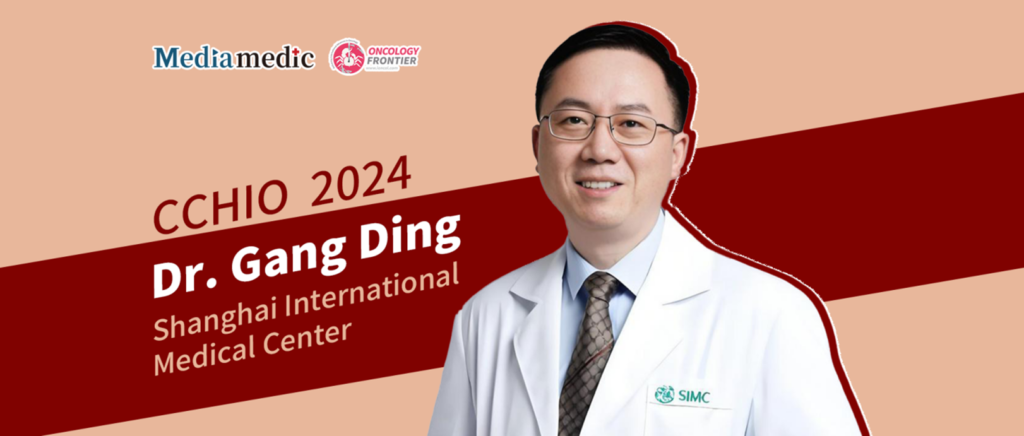
The 2024 Chinese Congress on Holistic Integrative Oncology (CCHIO) concluded successfully on November 17. Following the strategic framework of "collaborative integration" in disciplinary development, the conference established dedicated sessions on tumor rehabilitation, health education, cancer prevention, and screening. These sessions offered comprehensive and multidimensional insights into new perspectives, technologies, and concepts for the full-cycle management of oncology, spanning prevention, screening, diagnosis, treatment, and rehabilitation.Dr. Gang Ding and his team from Shanghai International Medical Center have long been committed to advancing comprehensive cancer care and disciplinary development. They place great importance on public health education, focusing on cancer prevention, health literacy, and nutrition. Their efforts include founding the first “Patient Education Center” in China, which combines online and offline resources to provide accessible cancer education and health information to the public. These initiatives have significantly enhanced public health awareness and self-care capabilities.
During the conference, Oncology Frontier invited Dr. Gang Ding for an exclusive interview. He shared insights on the clinical value of tumor rehabilitation, recent advancements, and the team’s ongoing explorations. Additionally, he discussed his team’s experience in conducting cancer education and awareness campaigns.
Oncology Frontier: At this year’s CCHIO conference, you chaired the special discussion on the development of cancer rehabilitation organizations. Based on your practical experience, how do you think cancer rehabilitation organizations contribute to improving cancer prevention and treatment in China? What progress has been made in this area?
Dr. Gang Ding: As we all know, advancements in science and technology have continuously improved clinical outcomes in the field of oncology. The Chinese Anti-Cancer Association (CACA) has introduced the concept of “integration,” making the comprehensive management of cancer—encompassing prevention, screening, diagnosis, treatment, and rehabilitation—a core goal. Among these, “rehabilitation” is the final yet most critical step in the cancer prevention and treatment continuum.
Health status is closely linked to disease outcomes, and the effectiveness of various treatments is directly influenced by physical health. Historically, clinical oncology practice has focused heavily on diagnosis and treatment, with limited exploration and experience in cancer rehabilitation. In recent years, CACA has made significant strides in this area, proposing rehabilitation concepts and publishing relevant guidelines. This reflects a growing recognition of cancer rehabilitation as a key component of cancer prevention and treatment. Moreover, this shift has encouraged greater participation from cancer patients in their own care, fostering a proactive and engaged approach to clinical treatment.
Additionally, rehabilitation initiatives tailored to local cancer prevention and treatment conditions have been implemented nationwide. For example, in Shanghai, we have undertaken various explorations in cancer rehabilitation, including establishing relevant associations to bring advanced rehabilitation concepts into homes and hospitals. These efforts aim to dispel patients’ fears about their disease and bolster their confidence in overcoming cancer. Looking ahead, with continued exploration, I believe China will gradually establish a rehabilitation system with unique Chinese characteristics, enabling more cancer patients to achieve meaningful clinical benefits during their treatment journey.
Oncology Frontier: “Integration is key to cancer prevention and treatment.” As a national health education expert, what role do you think health education plays in promoting multi-sectoral collaboration and social participation in cancer prevention? What are your expectations and suggestions for the future of health education?
Dr. Gang Ding: In recent years, the entire healthcare sector has actively engaged in health education efforts. Through this process, we have increasingly recognized the vital role of public education in disease prevention and control. Given the unique characteristics of cancer, which involve many uncertainties in clinical practice, our patient-focused education initiatives are continually evolving, guided by clinical experiences.
First, we actively promote knowledge about standard treatment protocols and the latest research progress for common and prevalent cancers, helping the public better understand the nature of cancer, treatment principles, and advancements in technology.
Second, we emphasize interaction between frontline healthcare professionals and patients, bringing education directly to patients. This approach allows them to gain clear and efficient knowledge about disease diagnosis and treatment. For instance, in Shanghai, organizations such as the Shanghai Health Promotion Center, the Shanghai Anti-Cancer Association, and the Chinese Anti-Cancer Association’s Science Education Committee have conducted a variety of public education activities, enabling the public to learn about cancer in a relaxed and engaging environment.
Finally, in this digital era, as “Internet+ Healthcare” has become a national strategic focus, health education methods are no longer limited to face-to-face interactions. Increasingly diverse online formats are being developed to deliver educational content, providing more effective and accessible cancer prevention knowledge to the public.
Dr. Gang Ding
- MD, PhD
- Chief Physician, Professor, and Doctoral Supervisor in Oncology
- Master’s Supervisor in Health Management
- Recognized as a leading talent in health education in Shanghai
- Recipient of Shanghai’s Outstanding Health Educator Award
- Shanghai Municipal Leading Medical Talent
- Designated as an Excellent Discipline Leader by the Shanghai Health System
- Head of Key Oncology Specialization, Shanghai Municipal Health Commission
- Recipient of numerous awards, including “Top Ten Doctors,” “Benevolent Doctor,” and “Outstanding Doctor” nominations in Shanghai
- Winner of the 11th Silver Snake Award from the Shanghai Municipal Health Bureau
- Nominee for the Fifth Top Ten Young Medical Administrators in Shanghai
- Deputy Chair of the Rehabilitation Committee of the Chinese Anti-Cancer Association
- Deputy Chair of the Sensory and Motor Division, Chinese Neuroscience Society
- Deputy Chair of the Translational Pain Research Committee, Chinese Physiological Society
- Vice President of the Health Management Equipment and Technology Division, Chinese Medical Equipment Association
- Standing Member and Secretary of the Shanghai Oncology Specialist Division, Shanghai Medical Association
- Member of the Shanghai Interventional Quality Control Committee
- Deputy Chair of the Traditional Medicine Committee, Shanghai Anti-Cancer Association
- Vice President of the Shanghai Social Medical Institutions Association and Chair of its Oncology Division
- Executive Member of the Shanghai Health Economics Society
- Deputy Chair of the Hematology Committee, Pudong Medical Association
Specialties: Translational research on the recurrence and metastasis of solid tumors, with a particular focus on personalized treatments for refractory cancers; hospital disciplinary development and management.


